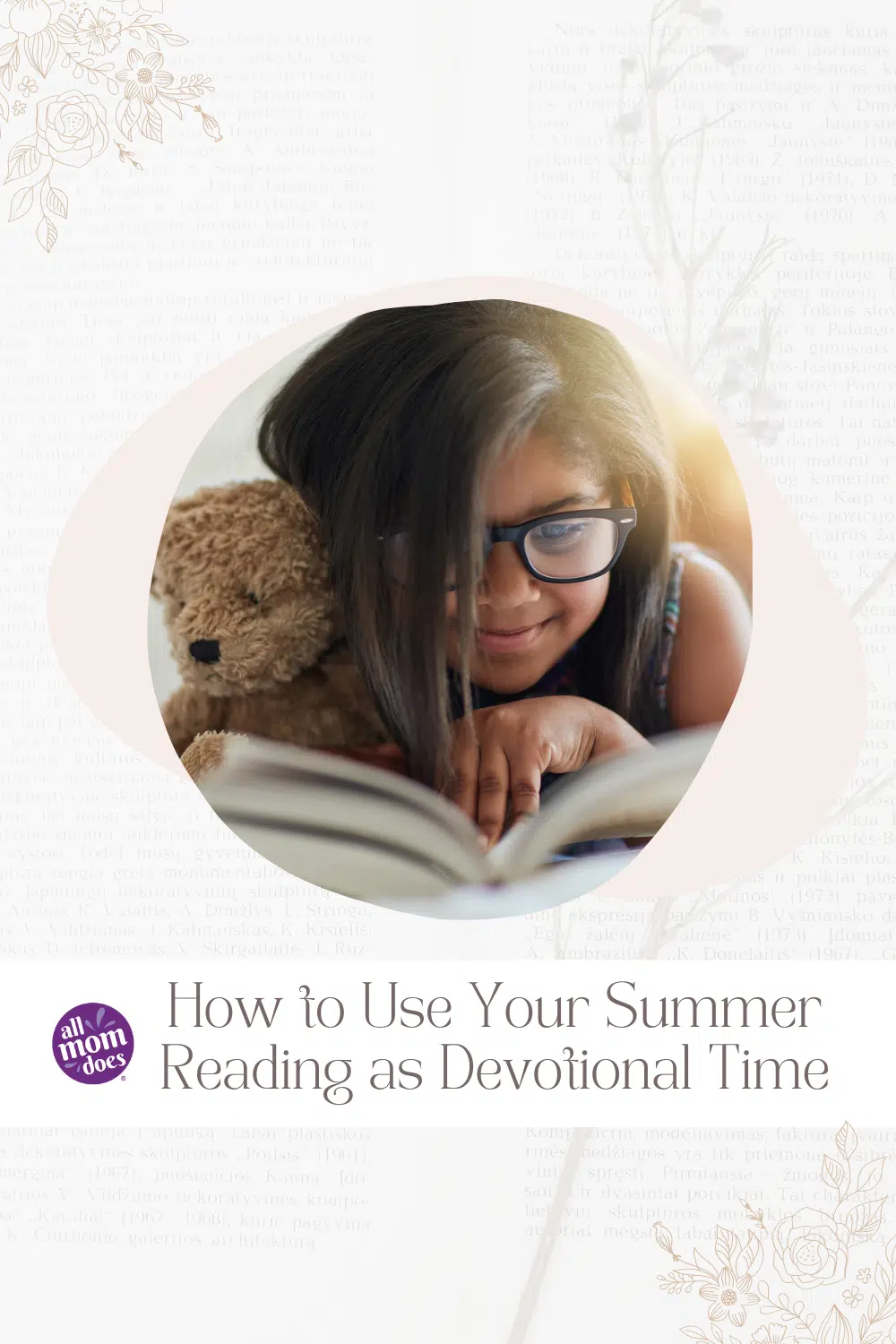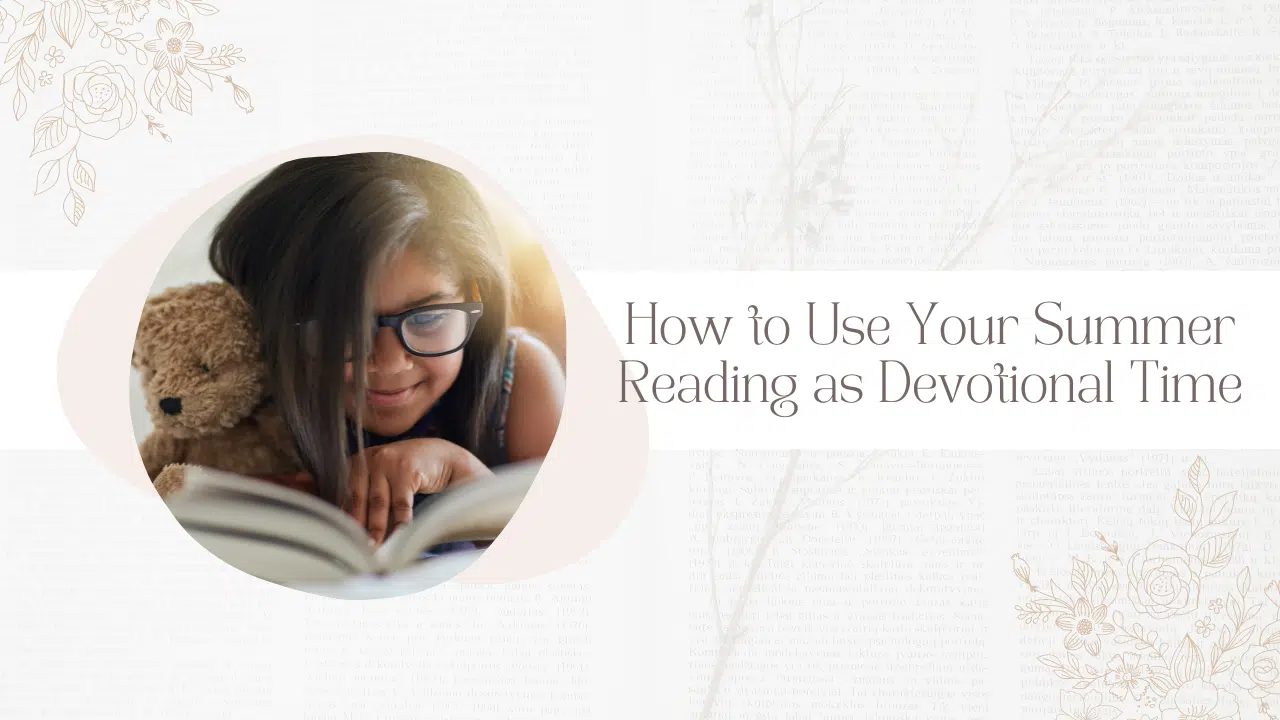As a young mom, my devotion to family devotions was, um . . . pretty un-devoted. But what I did love, as a bookworm and then aspiring author, was reading books with my children. And throughout their early childhood, I used these stories as jumping off points for good conversations about kindness, compassion, selfishness, anger, obedience, or love.
If you find that sticking with a weekly devotional plan or regularly reading the Bible with your child is a challenge, consider using your summer reading list as a springboard for devotions.
So, what do picture books or middle grade fantasy, for instance, have to do with learning more about Jesus–how to know him and live for him?
Professor Vigen Guroian explains that stories (specifically classic tales) awaken what he calls the “moral imagination.” Guroian describes this awakening as a light that enters the eyes–especially through story–and enables children to see in a new way, to tell good from evil, and to respond.[1]
Scripture illustrates this very process, as we see story engaging both the intellect and emotions of people to affect a change of heart.
A stunning example is found in 2 Samuel 12 when the Lord sends Nathan to tell David a story. This wasn’t for the king’s amusement, but a way to open his eyes to the great sin he had committed in taking Bathsheba from her husband Uriah and then causing Uriah’s death.
Jesus also taught his hearers over and over again through story via parables. Recall the story of the prodigal son. As you read it, you may see yourself as the wayward child in need of forgiveness, the jealous and self-righteous brother, or the parent, rejoicing when your child realizes their error and returns home.
For families looking for a structured Bible reading and discussion time, consider building it into any summer reading you’ve planned.
What you’ll need:
- 10 minutes
- A current book your child is reading or you are reading to your child
- One or more questions depending on the age of the child
- A Bible or Bible app for quick reference
Here are a couple examples:
Every night before bed, you read a picture book to your five-year-old. Tonight’s book might be about a child who is afraid of the dark.
- Ask your child what they are afraid of.
- Read one verse from the Bible that talks about trusting God with their fears, such as the first part of Psalm 118:6 (NIV): “The LORD is with me; I will not be afraid.”
- Use the words of the verse as a bedtime prayer.
Or each evening after dinner, you and your older child sit outside to enjoy the summer weather and to read another chapter from their favorite fantasy series.
- Ask your child questions like: What is happening right now in the story? How do you feel about the choice the character made in that situation? What might you have done differently?
- Read a few Bible verses, or a story or parable, that relates to the scene or overall theme of the chapter or book. For instance, if the character in the book has to decide whether or not to forgive an enemy, read what Jesus says in Matthew 5:43-45.
- Pray together about a situation in your family’s life or the life of another person that might relate. Following the example above, your child might pray for strength and wisdom in dealing with a bully.
Practicing this weekly, rather than every day, honors the child’s need for quiet reading time. Quality books, especially, will continue to engage their moral imagination, even when you aren’t overtly discussing “the moral of the story.” Guroian explains how this occurs:
[Stories] are seeds planted in the mind, the intellect, and the imagination, which grow into greater images that we act upon in our lives, that we recall, not even deliberately, when we are faced with certain situations, which are analogous, perhaps, to what is already planted in our minds and imaginations . . . With these images and metaphors, the moral imagination draws these correspondences in life that enable us to make judgments, to choose good over evil, to do what is right.[2]
Sources:
[1] Guroian, Vigen. Tending the Heart of Virtue: How Classic Stories Awaken a Child’s Moral Imagination (Oxford, UK: Oxford University Press, 2002).
[2] “Dr. Vigen Guroian, The Child’s Moral Imagination,” (transcript), Ancient Faith Ministries, November 3, 2012,
PIN THIS!

About the Author:
 Amanda Cleary Eastep is the author of the new Tree Street Kids middle grade (8-12) series from Moody Publishers in Chicago. Books 1 and 2, Jack vs. the Tornado and The Hunt for Fang, released in April 2021. The next two books in the series release in summer 2022. Visit treestreetkids.com.
Amanda Cleary Eastep is the author of the new Tree Street Kids middle grade (8-12) series from Moody Publishers in Chicago. Books 1 and 2, Jack vs. the Tornado and The Hunt for Fang, released in April 2021. The next two books in the series release in summer 2022. Visit treestreetkids.com.

















